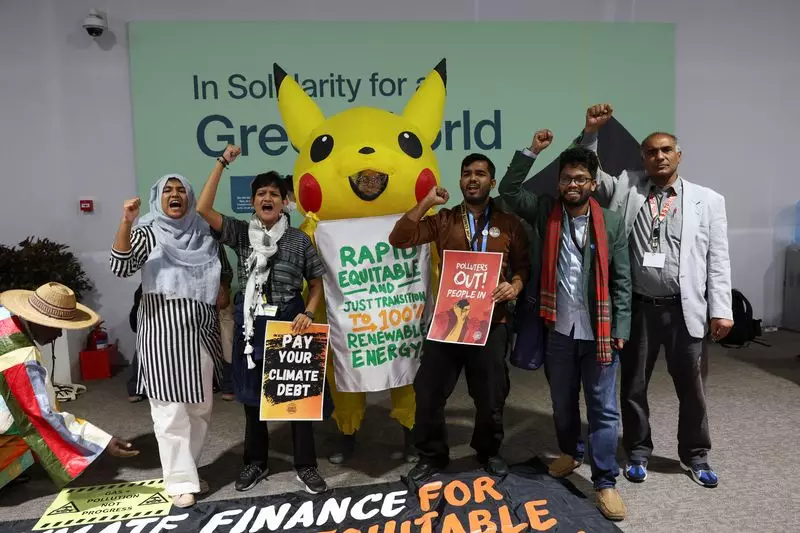In the backdrop of the COP29 climate talks in Baku, a coalition of nations recovering from conflict is pressing for a significant increase in financial aid to address both climatic adversities and security challenges. Their request, detailed in a letter obtained by Reuters, seeks to bolster annual funding to over $20 billion, in a bid to enhance their resilience against devastating natural disasters. This demand highlights a broader ambition among affected countries to secure a robust foothold in climate negotiations, underscoring the critical role of financial resources in combating the escalating impact of climate change.
These conflict-affected states, often caught in a web of socio-political strife, are in dire need of financial support to prepare for and mitigate the impacts of extreme weather phenomena. The urgency of their appeals is not unfounded; for island nations like those in the Pacific, rising sea levels threaten their survival, while rainforest nations emphasize their need for financial assistance to safeguard unparalleled carbon sinks. The struggle for these nations is exacerbated by their perceived riskiness to private investors, which significantly hampers their access to crucial financial resources. Consequently, multilateral funding, particularly from U.N. initiatives, becomes essential for vulnerable populations striving to cope with the consequences of war and inclement weather patterns.
In a progressive response to these challenges, the Azerbaijani Presidency at COP29 has initiated a new ‘Network of Climate-vulnerable Countries’. This initiative, which includes members from the g7+, an intergovernmental assembly of fragile states, serves to advocate collectively for increased climate finance. By assembling as a united front, these nations aim to amplify their voices in discussions with financial institutions, enhance their capacity to manage and deploy incoming funds, and strategically outline national platforms that attract high-impact investments.
Countries such as Burundi, Chad, Iraq, Sierra Leone, Somalia, Timor-Leste, and Yemen have already come on board with this collaborative initiative. Abdullahi Khalif, Somalia’s chief climate negotiator, shared his optimism on the sidelines of the Baku discussions, expressing hope that this platform will transform the financial landscape for nations in severe need. The newly formed network emerges as a response to a prior letter sent by the g7+ group, appealing directly to key international organizations such as the United Nations and the World Bank to underscore the necessity of robust financial commitments during COP29.
Despite existing frameworks designed to support the world’s least developed countries, advocates stress that conflict-impacted nations face unique adversities that often go unrecognized in broader climate discussions. As highlighted by Habib Mayar, deputy secretary-general of the g7+, a flood in South Sudan, exacerbated by ongoing conflict, can result in catastrophic outcomes that traditional developing nations may not experience to the same degree. The stark realities are underscored by alarming statistics: children born in conflict-ridden South Sudan are 38 times more likely to be displaced internally due to climate-related incidents than their counterparts in Europe or North America.
Unfortunately, even in the face of such daunting statistics, financial flows toward conflict-affected countries have been grossly insufficient. An analysis by ODI Global reported that these nations received only $8.4 billion in climate funding in 2022, a mere quarter of the $35 billion deemed necessary to adequately address their evolving climate vulnerabilities. Mauricio Vazquez, head of global risks and resilience policy at ODI Global, accentuated the distressing narrative that current climate financial efforts are failing to meet the needs of the most vulnerable populations worldwide.
If COP29 is to support the most climate-vulnerable populations, it is critical that the commitments made translate into tangible resources. The formation of coalitions such as the Network of Climate-vulnerable Countries is a pivotal step towards fostering solidarity among nations facing similar struggles. As discussions unfold, the onus lies on both developed nations and global financial institutions to heed these appeals and act decisively.
The outcomes of COP29 will reflect the world’s commitment to address climate change equitably, ensuring that no nation, especially those grappling with the dual crises of conflict and climate change, is left behind. The urgency to act is not only about financial transfers but also about forging paths of resilience, enabling affected countries to thrive in the face of adversity. As climate discussions progress, it becomes increasingly urgent to prioritize those most impacted, ultimately striving for a future where equity and sustainability are binding themes in the international climate agenda.

